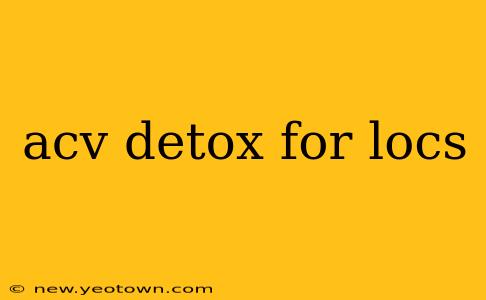ACV Detox for Locs: A Deep Dive into Cleansing and Maintaining Healthy Hair
For those embarking on the loc journey, maintaining healthy, clean hair is paramount. Apple cider vinegar (ACV) has emerged as a popular natural remedy for a variety of hair concerns, and many are curious about its potential benefits for locs. This deep dive will explore the purported advantages and disadvantages of using ACV as a detox for locs, answering common questions and providing a balanced perspective.
This isn't just a quick guide; we'll unravel the science behind ACV's effects on the scalp and hair, separating fact from fiction. We'll discuss how to safely incorporate ACV into your loc maintenance routine and highlight the importance of listening to your hair's unique needs.
What are the benefits of using ACV for locs?
The allure of ACV for locs primarily stems from its potential to balance the scalp's pH. A healthy scalp pH is slightly acidic, and ACV, with its acetic acid content, can help restore this balance. An imbalanced pH can contribute to issues like dandruff, itching, and even fungal growth. By gently restoring the acidic environment, ACV may help alleviate these problems and promote a healthier scalp environment for your locs to thrive in. Many believe it also helps remove product buildup and clarify the hair, leaving it feeling cleaner and lighter.
Does ACV help with removing buildup in locs?
Yes, ACV's acidity can help break down product buildup, which is a common concern for people with locs. Heavily-styled locs can accumulate residues from gels, creams, and other styling products. This buildup can weigh down the locs, making them appear dull and lifeless, and potentially leading to scalp irritation. ACV, used correctly, can aid in dissolving this buildup, leaving your locs feeling cleaner and healthier. Remember, though, it's not a miracle cure; persistent buildup may require more intensive cleaning methods.
How often should I use ACV on my locs?
This is where things get nuanced. There's no one-size-fits-all answer. Overusing ACV can strip your hair of its natural oils, leading to dryness, brittleness, and even damage. A good starting point is once a week or even bi-weekly. Pay close attention to your scalp and hair's reaction. If you notice dryness or irritation, reduce the frequency. Always dilute the ACV with water; a common ratio is 1:1 or even 1:2 (ACV to water).
Can ACV lighten locs?
While some anecdotal evidence suggests ACV can lighten locs, it's not a reliable hair lightening agent. Its effect on hair color is minimal and inconsistent. If you're aiming for significant lightening, you should explore professional hair lightening services. Trying to lighten your locs with ACV alone might be disappointing and may not achieve the desired results.
What are the potential downsides of using ACV on my locs?
The biggest risk is overusing ACV. This can lead to dry, brittle locs, and scalp irritation. Some individuals may also experience allergic reactions. Before applying ACV to your entire scalp and hair, it’s always a good idea to test a small patch of skin to check for any negative reaction. Additionally, the smell of ACV can be pungent for some; diluting it with water helps mitigate this, but it's still something to consider.
How do I use ACV on my locs?
The method is relatively straightforward. Dilute ACV with water, ensuring it's a solution comfortable for your scalp. Pour the solution over your wet locs, gently massaging it into your scalp. Leave it on for a few minutes (no more than 15) before rinsing thoroughly with clean water. Follow up with your regular moisturizing routine to replenish any lost moisture.
In conclusion: ACV can be a valuable addition to your loc maintenance routine, offering potential benefits such as balancing scalp pH and removing buildup. However, moderation and attention to your hair's response are key. Always dilute ACV, start with infrequent use, and listen to your hair's needs. If you have concerns or experience any adverse reactions, consult a professional hair stylist or dermatologist. Remember, consistency and a holistic approach to hair care, including proper cleansing, moisturizing, and protection, are crucial for healthy, thriving locs.

